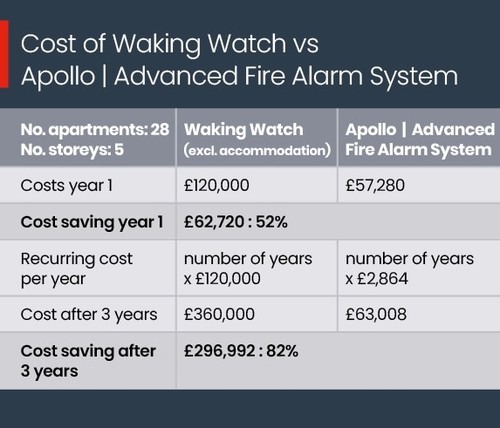WAKING WATCH VS FIRE ALARM SYSTEMS : Ensuring fire safety in residential buildings with flammable cladding
Apollo Fire Detectors and Advanced, leading UK fire safety specialists and manufacturers, have joined forces to offer a fully compliant, cost effective alternative to a Waking Watch, providing superior protection for residents.
The 2017 Grenfell tragedy brought to light multiple fire safety issues in residential high-rise buildings. From December 2018, in line with Government Advice, all buildings over 18m had to be assessed for combustible material in their external walls and in January 2020, Advice for Building Owners of Multi-storey, Multi-occupied Residential Buildings was published, advising that “the need to assess and manage the risk of external fire spread applies to buildings of any height”.
The assessment of fire risk in external wall systems for residential buildings is recorded in Form EWS1: External Wall Fire Review. If combustible materials are found present, the cladding must be removed and additional temporary fire safety measures are required to ensure occupants are protected. In such circumstances, The National Fire Chiefs Council (NFCC) advises that the Stay Put policy must be temporarily replaced by a simultaneous evacuation strategy until the building has been remediated and either a 24/7 Waking Watch or a common Fire Detection & Alarm system must be introduced.
A Waking Watch is a surveillance system carried out by trained fire marshals or wardens, who patrol the building 24/7 to alert residents and assist their evacuation in the case of a fire. Waking Watch measures can be introduced quickly, however, research by the Sunday Times states that the average duration of remedial work is 3 to 5 years, which means that costs quickly mount up.
If the cladding removal is expected to take more than 12 months, the NFCC strongly recommends that a temporary common fire alarm system is installed over a Waking Watch.
“A temporary common alarm system, when designed, installed and maintained appropriately, is a more reliable and cost-effective way to maintain a sufficient level of early detection.”
The government support the NFCC recommendations and has recently announced a £30 million fund to help end excessive Waking Watch costs to help worried leaseholders.
The Apollo|Advanced Fire Alarm System fully complies with NFCC guidance and can be installed quickly with minimal disruption for residents.
The Advanced MxPro control panel manages Apollo’s wireless XPander® and wired Soteria® detector ranges to ensure early detection of fire and alert to residents. Recommended by Installers for its effectiveness, flexibility and ease of installation, the Apollo|Advanced system provides an efficient and cost-effective alternative to a Waking Watch. Once the cladding is removed and Stay Put policy in the building is restored, it can be converted to evacuation alert system, in line with the new BS8629 code of practice, to aid Fire & Rescue Service in the evacuation of residents.
Find out more about the solution here: https://www.highrisefiresafetysolutions.co.uk/
Waking Watch vs Fire Alarm System: How do the costs compare?
The Ministry of Housing, Communities and Local Government, conducted research into the costs of a Waking Watch. According to their data, the charge for a Waking Watch can vary between £116 to £499 per dwelling per month based on the hourly charge per warden across different parts of the UK. Additional charges for equipment, facilities, accommodation and services can also be applied and, in most cases, the cost must be covered by the leaseholder, leaving many tenants at risk of bankruptcy. The same research states: “The cost of employing one person/individual undertaking Waking Watch duties exceeds the average cost of installing an alarm system in 3 to 6 months.”
Remedial works can be lengthy and Waking Watch costs are ongoing. Installing a fire alarm system is a one-off cost with relatively low ongoing annual maintenance charges and typically delivers cost savings of more than 50% in the first year, rising significantly with each subsequent year.
Above is a table illustrating the cost for a Waking Watch vs the Apollo|Advanced Fire Alarm system in a 5-story block with 28 apartments. Cost savings of £62,720 are realised in the first year, mounting to nearly £300,000 over a period of three years. Apollo offers a bespoke Leasing Programme to remove financial barriers and enable building owners to install the right fire alarm system when required. There is no major upfront investment and the cost of installation can be spread in fixed monthly payments over a period of up to 7 years.
In summary: why choose the Apollo|Advanced Fire Alarm System over a Waking Watch?
01: Superior protection for residents The Apollo|Advanced Fire Alarm System consistently monitors the whole building, sensing for fire ever second. With no room for human error, it enables early detection and alert for residents, maximising their safety.
02: More cost-effective than a Waking Watch The Apollo|Advanced Fire Alarm System will pay for itself within 3-6 months post-installation, while the cost of a Waking Watch is ongoing. Government research states that each apartment within a high rise residential building can typically save between £116 to £499 per month with the installation of a fire alarm system compared to the cost of a Waking Watch.
03: Quick installation with minimal disruption The Apollo|Advanced Fire Alarm System is quick and easy to install. Wireless technology means that there’s no damage to compartmentation, unsightly cabling or redecoration to worry about, minimising disruption for residents. With a global reputation for innovation, quality and reliability, Apollo|Advanced are committed to keeping people safe from fire every second of every day.
To find out more, or for free advice to help building owners choose the most effective fire safety solution for their needs, please get in touch at:
www.apollo-fire.co.uk/get-in-touch.
For all press enquiries please contact Jessica Mann:
jessica.mann@apollo-fire.com
Mobile: +44 (0)7384 548 767
